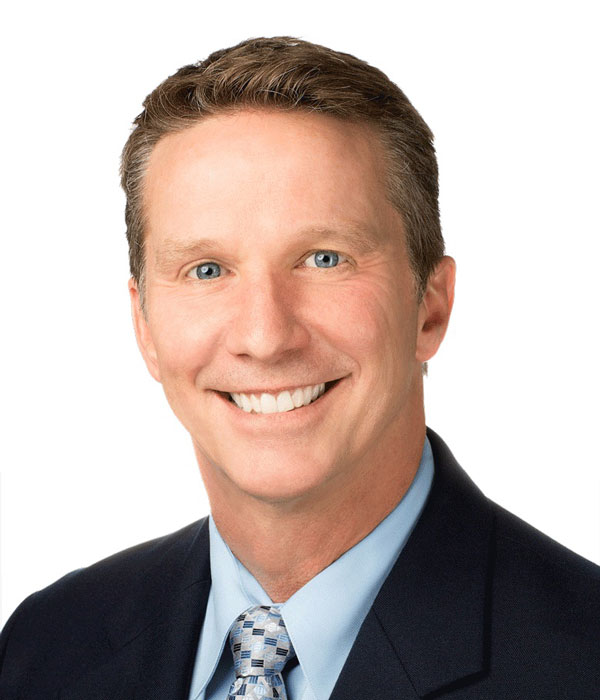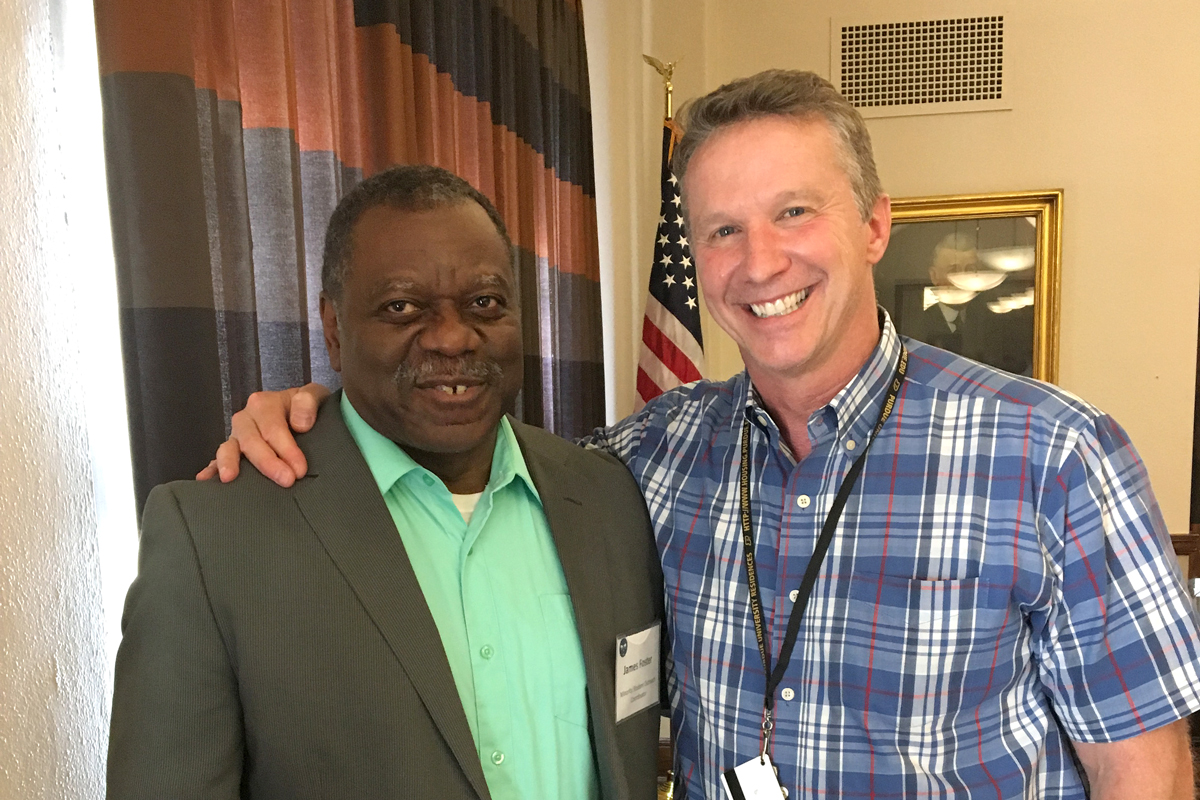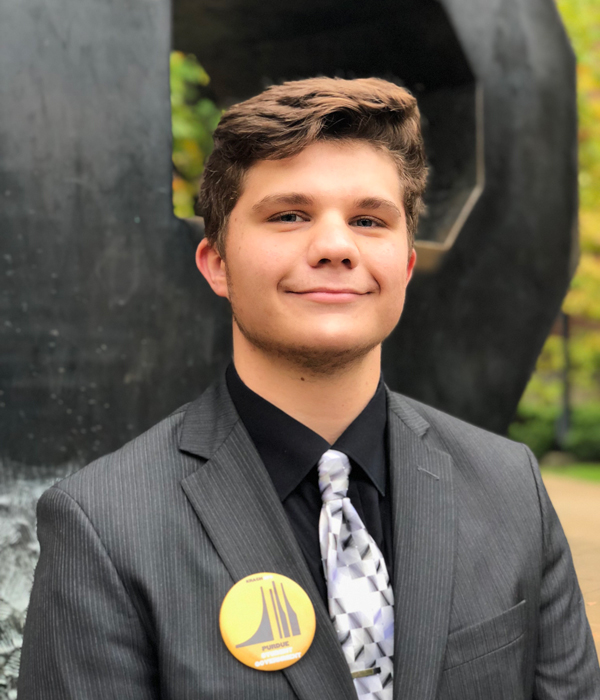
January 2018
Alumni Profile
Dr. Chuck Dietzen Chooses Next Adventure in Residence Program

Dr. Chuck Dietzen has long juggled multiple projects in his work as a pediatric rehabilitation specialist. His profession and philanthropy have taken him both around the globe and back home to Purdue University, from which he earned a Bachelor of Science in animal sciences in 1986.
In addition to being named an Old Master by Purdue, Dietzen has returned to campus as a guest lecturer and, most recently, participated in University Residences’ Executive-in-Residence program in fall 2017. One of the most popular events during his stay on campus was the Timmy Takedown, when Dietzen dressed as “Dr. Doom” to take on patients of Riley Children’s Hospital in a pretend wrestling match.
Dietzen’s next opportunity on campus, however, is one that is uncharted territory for him. Dietzen will become a permanent resident of Third Street Suites in early February. Having a distinguished medical professional in residence on campus is a unique and exceptional opportunity for students to receive mentorship and guidance, as well as create connections and opportunities for real-world experience.
“This was presented to me as an opportunity to ‘create your own adventure,’” said Deitzen. “I thought that was good. I like adventure.”
Dietzen’s residency will begin February 5. He plans to be on campus one week each month at the beginning of his residency as he juggles responsibilities at Riley Children’s Hospital as well as a multitude of projects and programs through Timmy Global Health and other endeavors. Dietzen’s residency is planned to be continual, with additional opportunities expected to be added as his role develops.
Serving as an Executive-in-Residence helped spurn Dietzen’s interest in an extended residency program at Purdue. While serving as an EiR, Dietzen built relationships with students through both formal and informal programming. Dietzen cited interactions with international students through UR Global as a contributing factor to his interest in performing more work through Purdue.
“What was neat for me is that this felt more like a homecoming than going back home,” said Dietzen.
“I was very pleased with what these young men and women have in mind to improve their country and to change the world through what they’re gaining here. That’s the kind of stuff I’m always looking for.”
Setting students up for immediate success and creating opportunities for real-world learning experiences is at the top of Dietzen’s agenda.
“What I want to do is to take the students’ ideas and help put them into action long before they even graduate,” said Dietzen.
One of the unique opportunities Dietzen was able to offer students was when he and other medical professionals were invited to help advise on improving healthcare in Serbia. When two colleagues had to back out within a week of the trip, Dietzen filled the spot with two undergraduate medical students. Dietzen also cited a connection created between students from India and Bangladesh, who were interested in using drones to deliver medical supplies to remote areas, with a professional in the drone industry.
Dietzen said he plans to create similar opportunities for current students by inviting friends from numerous professions to campus to interact with students at dinner, over coffee, or just by sitting around and talking. With connections throughout the world, Dietzen is encouraged by the diversity of opportunities he can help connect Purdue students to.
“I’m excited about plugging students into that network,” said Dietzen.
Dietzen is the founder and president of Timmy Global Health, an Indianapolis-based nonprofit organization with the mission to expand access to healthcare in the developing world, while empowering students and medical professional volunteers to tackle global health challenges. Dietzen’s work in global medicine has included work in the Soviet Union, Haiti and India. He even worked alongside Mother Teresa. In 2015, Dietzen was the recipient of the highest honor a Governor of the State of Indiana can give: the Sagamore of the Wabash.
We invite readers to stay tuned for more information regarding upcoming programs organized by Dietzen.
Writer: Matt Vader

Employee Profile
Foster Continues to Have Impact on Campus Diversity
James Foster learned quickly upon arriving on Purdue’s campus as a freshman that he was a people person.
Foster initially came to Purdue in the fall of 1969 to study business. It was apparent to Foster even then that his calling didn’t lay in maximizing business profits.
“There was one of my advisors who was disappointed because I wasn’t really strong on getting in and making the highest profit I could make,” recalled Foster. “I wasn’t profit-oriented, I was people-oriented.”
It’s that approach towards people that enabled Foster to connect with and serve Purdue residents beyond his 37 years as a member of University Residences. The position Foster is perhaps most known on campus for is his time spent as manager of McCutcheon Hall, a capacity in which he served for 22 years.
It was during that time that Foster was presented with an opportunity that would transform the way he impacted students.
“I answered a call-out because the university was looking for people who wanted to volunteer to learn how to facilitate diversity workshops,” said Foster. “I accepted it as a personal challenge. I figured there was a way to work with that topic in a positive way without turning people off.”
His initial foray into working in diversity with University Residences was in a position split between diversity training and serving as an assistant manager for married student housing. During this time, Foster ramped up programming for married families, who hadn’t previously had the same access to programming that unmarried residents did. Among the changes Foster made were increasing the number of resident assistants and instituting educational resources for families, such as lessons in automotive repair and nutritional education for expecting mothers.
Foster realized his passion lay in diversity and he convinced University Residences that Purdue needed a full-time person devoted to diversity training and inclusion. His work evolved to reflect those needs.
Foster’s programs included diversity workshop training for resident assistants and staff impacting different areas of student life, including residences and kitchen staff. Foster was also the driving force behind University Residences’ Peer Mentor Program, which provides first-year minority residents from under-represented groups with encouragement and support as they transition to life at Purdue.
In addition to his work with University Residences, Foster became an ambassador for Purdue in the Greater Lafayette community. Foster led diversity training exercises for the Purdue, Lafayette and West Lafayette police departments, as well as the Tippecanoe County Sheriff’s Department. He also worked with Leadership Lafayette, an organization that uses experiential learning techniques and promotes the importance of diverse professionals through its leadership academy program.
Foster continues to give back even after his retirement. He continues to make an impact in working with Purdue’s Division of Diversity and Inclusion. One of the events Foster helped sponsor was a “Kickback” event that drew more than 130 students to the CoRec.
He continues to find enjoyment in his work with students.
“Being a people person, I really look for opportunities to help,” said Foster. “Look for harmony, look for connecting people and look for helping people.”
Writer: Matt Vader
Student Spotlight
Hieston Leads with Campus Inclusion in Mind

Purdue sophomore Mitchell Hieston’s interest in leadership was piqued almost immediately upon his arrival on campus as a freshman in Fall 2016.
At an event organized by resident assistants, Hieston learned of opportunities open on Shreve Hall’s executive board and was inspired to run for president of the hall. He was successful in obtaining the position, a potentially overwhelming prospect for a first-year student.
“I was really scared at first because I had lived in Shreve for a week and a half and all of a sudden I was president of residence hall club,” said Hieston.
Things have gotten less scary for Hieston as he has sought more leadership positions. This year, Hieston was elected president of the Boilermaker Chapter of National Residence Hall Honorary (NRHH) and serves as the Executive Director of Engagement for Purdue Student Government (PSG). In NRHH, Hieston found his own values mirrored in the organization as he sought to lead an executive board that returned just one member.
“The three things we focus on are service, recognition and leadership,” said Hieston. “I really think that it’s important to recognize leaders, to have emerging leaders and to have a funnel system for student leaders. It’s also really important to give back to the community. Those are the three pillars that NRHH prides itself on and I wanted to dig in further.”
Hieston’s values manifest in the type of work he has undertaken since stepping on campus. As president in Shreve Hall, Hieston was instrumental in planning and renaming the hall’s semi-formal event to encourage the inclusion of the entire campus community. Hieston also helped plan the annual West Side Block Party, a spring event open to all students.
In his work with NRHH and PSG, Hieston has increased volunteering opportunities and increased the involvement of the organizations in campus events. Volunteer opportunities have included visits to nursing homes, participation in campus winterization, making children’s blankets and having a presence at campus events. He is also helping preside over a rewrite of the PSG constitution, with the ultimate goal of creating a more sustainable structure for the organization.
The objectives associated with Hieston’s work are based on the spirit of inclusion and making the organizations and events he is associated with accessible to everyone on campus.
“I almost didn’t apply to my Purdue Student Government position because I thought it was a prestigious honor just to be on PSG and I didn’t think someone like me could possibly fill those shoes,” Hieston said. “I want to change that stereotype.”
Hieston hopes to continue to serve PSG while seeking more leadership positions. He plans to continue making leadership organizations inclusive for the remainder of his time at Purdue.
“I never would have thought that I could have accomplished the things I’ve done outside of academics,” said Hieston. “I really want to encourage other individuals to explore what there is to do on campus and get involved.”
Writer: Matt Vader
Writer: Matt Vader | Editors: Renee Kashawlic, Danielle Fawbush
Editorial Board: John Eckman, Renee Kashawlic | Inquiries Contact: studentlifemarketing@purdue.edu
